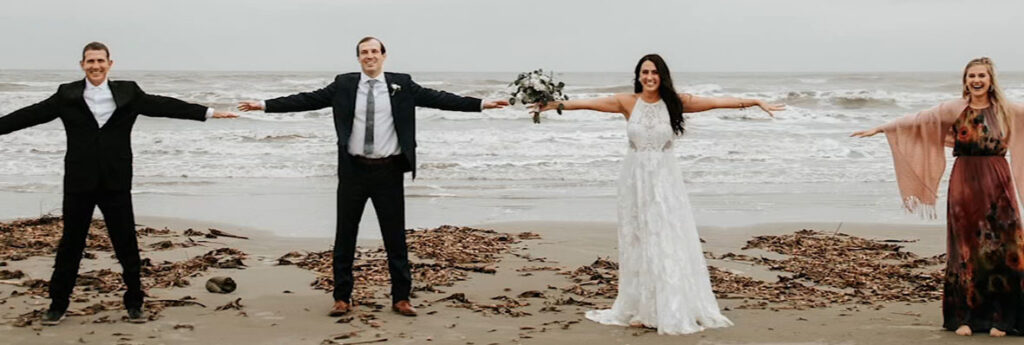Couples trying to salvage weddings put on hold by the coronavirus are feeding a fresh trend in the bridal industry: the “minimony.” Rather than wait, they’re getting hitched alone or with a few local loved ones looking on at a safe social distance as other guests join virtually. Then they plan to reschedule larger celebrations when allowed.
“We were about to put a $15,000 deposit down on a venue when coronavirus hit,” said Kate Whiting, 35, in Northern California’s tiny Lake Almanor Peninsula. “Why would I want to wait to marry my best friend?”
The 300-guest wedding of her dreams, and those of her 40-year-old fiance, Jake Avery, will happen once a COVID-19 vaccine is in place. For now, a close friend recently ordained will marry them in their yard June 6.
Their approach, born of necessity, is a play on micro weddings, the first choice for some couples looking for a more intimate experience or unable to afford splashier affairs.
Before the pandemic so dramatically changed lives, 20,000 to 30,000 weddings happened every weekend in the US, with more than 550,000 originally planned for April, May and June this year, according to data from the wedding planning site TheKnot.com.
Worldwide, 93% of couples whose weddings are impacted by the virus are rescheduling, with only 7% cancelling altogether, the site said.
The average cost of weddings pre-pandemic was teetering at just under $34,000, and the average guest count at 131.
Nicole Ochoa and Brad Wilkinson, both 27, had an initial guest list of 200-plus before choosing to go micro for their July nuptials. Really, really micro. The Sonoma County, California, couple decided on fewer than a dozen guests for the wedding on a ranch near home that overlooks estate vineyards.
“We just really wanted it to be personal,” Ochoa said. “I hope that other people can pause and consider this as an option. It feels like the wedding industry and wedding trends have turned into such a show.”
Guest lists of 50 or fewer accounted for just 8 percent of US weddings last year, down from 10 percent the year before, according to The Knot, which surveys more than 25,000 couples annually. Weddings with 51 to 150 guests encompassed 54 percent of couples.
Kristen Maxwell Cooper, editor in chief of The Knot, said couples who want to keep their original plans but worry that virus restrictions will drive their guest counts down might consider “shift weddings.”
Once conditions allow, she said, “They can host their ceremony with a group of 25 of their guests while live-streaming to the rest of their loved ones, followed by a reception with the same group who attended the ceremony for a few hours before the next group of guests arrive.”
With the second of three deposits due on their venue, Ochoa and Wilkinson are in the process of asking for a “force majeure” clause in their contract so they can get their money back in case virus restrictions remain in place.
“If the venue denies our request, we’ve decided to keep the date and get married in Nicole’s parent’s Sonoma County backyard,” Wilkinson said.
Ochoa added: “We would be incredibly sad if we can’t be married at the venue we fell so hard for, but there’s something pretty magical about the thought of walking across the lawn in my dress with my Dad, too.”
Vendors focused on micro weddings and organized elopements have seen an uptick in interest since the virus struck. Pop the Knot makes use of downtime at venues around the US. It operates in nine cities, including New York, Los Angeles, Atlanta and Austin, Texas.
“We already were quite busy, but sadly we have been receiving a ton of emails from clients that had their weddings cancelled due to COVID and are now wanting to do a small pop-up,” said owner and wedding planner Michele Velazquez.
SimplyEloped.com offers low-cost packages in destinations including the Florida Keys, Lake Tahoe and New Orleans.
“Since the coronavirus outbreak, I’ve had numerous couples come to me every day with similar stories: They’re cancelling their big wedding due to travel complications, not wanting to assemble a big group of people or other virus-related problems,” said the site’s editor, Karen Norian.
“These couples are heartbroken, not just about the financial losses, but the thought of pushing their marriages out to some ambiguous future date is devastating,” she said.
Renee McCarthy and her husband, Ryan McCarthy, live in San Diego and wed at Temecula Creek Inn in Temecula, California, in March 2019, with 24 guests attending.
“We both wanted to focus on the guests we did have there, our families and closest friends,” Renee said. “Even for a small wedding it was overwhelming trying to put it together, but we couldn’t be happier with how our wedding turned out.”

